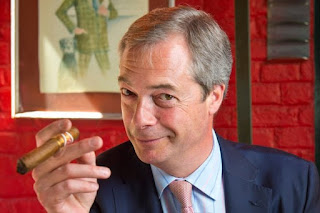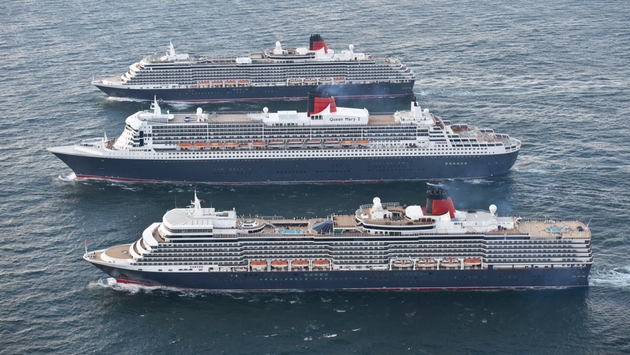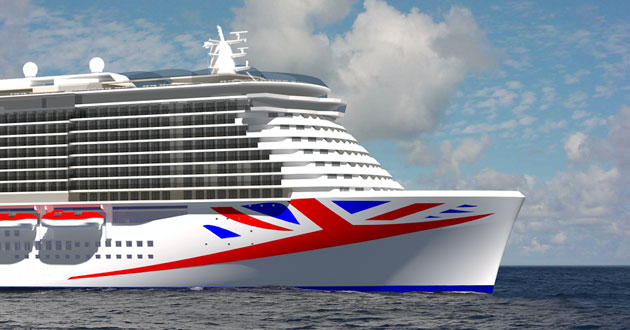After the exit voting the UK economy, cruise industry
and luxury brands suffer.
by Earl of Cruise
by Earl of Cruise
If you were looking for a metaphor for the impact
of Brexit, a tornado or an earthquake would seem most apt. In any case the
destruction is severe.
The consumer confidence sank since after the awakening
the morning after to a historic low. The charts show it has its biggest
fall in 21 years - post-referendum. The pound is propelled into
a rapid downward spiral and now plumbing depths not seen since the
mid 1980s. And foreign money ebbs down, but is desperately needed to
cover the immense state depts.
The business reaction? Hatches battened down - by
freezing recruitment and investment decisions, to ride out the storm.
British companies look for future investments on the continent. And the foreign
companies hold back any investment in the United Kingdom. Except a very few
companies which are from the train industry, as there is a significant need in
investments - tracks, coaches and locomotives.
Will this immediate impact, as
destructive it is, stay?
Will there be another Great
Depression as that from the mid 1870s or the following of 1929?
Will it be short-lived?
And what about Scotland?
What will happen in Northern Ireland, when the border
to Eirie is closed again?
The `leave´ campaigners had no ideas what will be
after, when their lies fueled campaign will result in the happend `exit´? Especially
Farage, who is now luxuriating on his EU parliament income as privateer. The
`leave´ campaign had been further fueled by the idiotic `fear causing´
arguments of the `stay´ campaigners. And the new Prime Minister and her
gouvernment has no clue how to handle this unheard of `exit´ situation.
© ETF News and MIRROR
A frightening sight, Farage shared a stage with Donald Trump
last month - © Gerald Herbert AP
- Pound Sterling examples
Luxury marketers need to look beyond this short,
sharp, disaster that has beset the United Kingdom's economy. And in that
regard, the impact of Brexit is more nuanced, with pros and cons depending on the nature of the luxury business.
Take the weakened state of Sterling: for some
businesses it is good news, for others, bad. The luxury travel
sector is a prime example. Those luxury hotels and travel
businesses relying on well-heeled British holidaymakers
traveling overseas would be wise to tighten their belts.
Hedged currency will eventually run out and holiday
costs will rise sharply, particularly to those destinations priced in US Dollars
which is most of the world outside the European Union and the "hated"
EURO. The likelihood is: fewer will travel, and those who do will
have less to spend.
Luxury hotel operators in the United Kingdom,
however, have no doubt been exchanging high-fives and fist bumps. The weak
pound makes Britain an attractive destination for overseas visitors who will
have plenty more cash in their pockets.
Domestic tourism will also see a surge as would-be
jetsetters survey the reality of the exchange rate boards
and decide a "staycation" is the prudent option this year. But it
will see too a downward spiral in prices, and in the end lesser income for the
operators.
QUEEN VICTORIA, QUEEN MARY 2 and QUEEN ELIZABETH - Photo courtesy of Cunard Line
- The Cruise
Industry
As Britain has voted `leave´ the European Union,
cruise travel implications will begin to emerge. Not just for British brands based
like CUNARD Line and P&O CRUISES, but larger companies like CARNIVAL Corp.,
NORWEGIAN CRUISE LINE Holdings Limited and ROYAL CARIBBEAN CRUISES Limited and
others.
Even before the Brexit decision was finalized, the
initiative was causing not only cruise industry stock prices to
weaken among investor concern. Performance numbers have also been affected
by reduced European cruise demand in general, according to WELLS FARGO
Securities.
Corporately,
CARNIVAL, NORWEGIAN and ROYAL CARIBBEAN have all suffered!
The thinking was that United Kingdom remaining in the EU
would improve the stocks. Now that is less likely to happen as WELLS FARGO
analyst Tim Conder was quoted,
"Economically,
a Brexit vote could in the short-term also negatively impact eurozone growth
and, to a lesser degree, global growth."
The overall assessment, from a travel perspective, is
that the potential downside of leaving the EU cannot be matched by the
potential upside.”
Fred. Olsen Cruise Lines does not have a comment
regarding Brexit specifically but stresses that the company follows exchange
rates, saying,
"The
only point that we make to our guests, as we did 4 to 5 years ago, is that we
have Sterling prices on board, so when the exchange rate is against us, it does
not have the same impact as taking a holiday in Spain, for example, or those
cruise lines that price in Dollars on board."
What policy changes will result from Brexit that
affect cruise travel more broadly are still to be seen. They could have a
massive impact on frequent international sailings based in Southampton, and
other ports, among voyages to and from British homeports and destinations, as
well as relationships with European source markets.
When asked for comment, Cruise Lines
International Association (CLIA) provided the following statement:
"As
with other sectors, the cruise industry relies on stable business frameworks
and regulatory certainty to operate efficiently. This is why CLIA hopes that
Europe's stability and business environment will not be unduly affected. CLIA
will continue to work with authorities to promote stability and ensure that
cruising continues to thrive and carries on making a vital contribution to
Europe's economic growth."
P&O CRUISES has announced, that it plans to build a 5,200 lower bed passenger vessel for cruises out of British ports. It will be delivered in 2020, and is then the biggest passenger ship ever built for the UK market.
The LNG (Liquified Natural Gas) powered ship will be about 185,000 GT, and is based on the design for the four new cruise vessels for CARNIVAL CORP. subsidiaries AIDA CRUISES and COSTA CRUISES. These designs have a max capacity of 8,500 passengers aboard. And it is the same with the yet unnamed P&O newbuild.
P&O´s new cruise vessel - Photo courtesy of P&O CRUISES
The new CARNIVAL design is 45,000 GT smaller than ROYAL CARIBBEAN´s OASIS Class vessels with less than the CARNIVAL´s total capacity.
The new vessel comes handy and covers the trend since BREXIT - paying less, as there is or will be less to spend. And the number of crew is similar to the 3,647 passenger capaicity of BRITANNIA.
See the cruise review about the 141,000 GT BRITANNIA here.
High density gets a new thrill ...
... and "class" and "style" may vanish, when ORIANA, as rumoured, will leave the fleet as the then smallest and oldest vessel of CARNIVAL´s possesion P&O ...
For the luxury brand retailers, fashion, etc., the outlook depends on which
markets contribute most to their sales, overseas or domestic. Those
with big international profiles and prominent London shops may well
benefit, especially the likes of Burberry and Mulberry. The hordes
of exchange-rate-enriched tourists that the weak pound brings into
Britain will be a welcome boost to their sales.
But what about the
lesser sales to the British customers, which tighten or have to tighten their belts?
And this pull effect is no theory: it is already manifesting
in practice. The demand for holidays from China in Britain has
skyrocketed and Chinese consumers are not only the biggest
buyers of high-end goods, they prefer to make those purchases
overseas, too.
But U.K. retailers who rely on the domestic demand
will be punished on two fronts: weak demand from U.K. consumers further
exacerbated by price inflation caused by purchasing goods from abroad with a
weakened pound.
And then we have the overnight shortage of new
employments.
- Inflation fears
It is predicted that inflation will return not
only to the fashion industry which is much produced and imported from
Europe and Asia, with a dampening effect on demand or margin, depending on
whether the companies affected pass that inflation on to
their customers in higher prices or not. However, for those that
produce in the United Kingdom and rely primarily on exports, such as
the Scottish whisky industry, reels of joy are in order as they will avoid the
escalation of costs and benefit from a reduction in relative
price compared to overseas manufactured rivals.
Looking beyond exchange rates, the
medium-term effect of Brexit on domestic demand is less clear
cut, although the likely impact of all this uncertainty is at least a
postponement of big-ticket purchases which will, at best, lead to a slowdown in
growth and, at worst, to a recession, or perhaps depression.
But even recession opens up opportunities
for luxury brands shrewd enough to recognize them.
Big-ticket items may well be postponed, but the
need for consumers to reward themselves with occasional luxury
purchases does not go away - it is just that these rewards become more modest
in scale. The last recession saw a growth in sales of items such as luxury
chocolates - an affordable pleasure - and the recession-proof nature
of the luxury lingerie industry no doubt reflects the fact that this
sort of luxury treat does not need to break the bank.
- No dice?
The cutback in media spend by those tightening their
belts can also lead to opportunities to make the same marketing budget deliver
a larger share of voice.
Media deflation is an opportunity for all brands,
not just those for whom the Brexitdice have fallen favorably. It has been
proven that those that increase their relative share of voice in tougher
times are the biggest beneficiaries when consumer
confidence returns, although marketers´ success in selling this may
depend on how enlightened their FD is.
Beyond any medium term slowdown or shallow
recession, the impact of Brexit will depend most on the success
of the negotiations with the European partners.
New Prime Minister Theresa May has made it clear
that there will be no free movement of labor in any deal with the EU. When
this free movement was negotiated, it was Britain which wanted in first place
the unrestricted free movement - forgotten and lied about by the `leave´
campaigners.
German Chancellor Angela Merkel has made it clear,
there will be no access to the single market without free movement.
Even non-EU members such as Switzerland, Iceland and
Norway have to abide by the free movement principle to retain access to
the single market!
It is likely that Britain will not be able to have its
cake and eat it. So there will be penalties for British companies exporting
their goods to the EU, although what they are and on which sectors they
will fall is impossible to tell.
Needless to say, United Kingdom luxury brands that
rely heavily on EU consumers will be wise to explore other potential
export markets, including Asia and the US market, over the coming years. But unfortunately they can´t call for the British Navy to open up markets ...
The immediate inmpact of Brexit may well have been a tornado, tearing through, or an earthquake, shaking terribly, the economic, social and political fabric of the British society. The sky is grey and threatening. But for those who are brave and visionairy, those who throw open the hatches, and look up into the sky ... there are tiny gaps in the clouds. They may close, but can tear open ...







Comments
Post a Comment